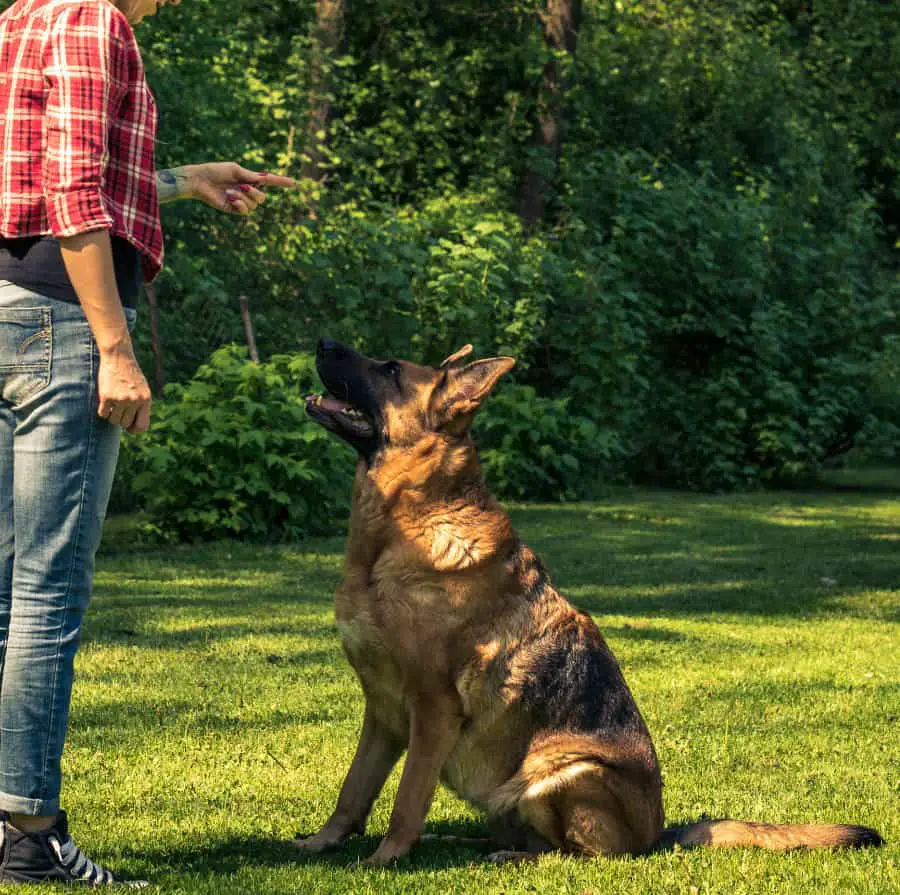German Shepherds are one of the most popular breeds of dogs in America. They are large, muscular dogs with a loyal nature and extreme intelligence. GSD, as they’re often known, can be very loving pets, however, their deep bark can result in noise complaints from your neighbors.
To get your German Shepherd to stop barking at your neighbors, you can teach your pet a command such as “Quiet”, or introduce your neighbors to your dog to remove any distrust and anxiety. Also, understand that you first have to know why it’s barking so you can address the situation accordingly.
German Shepherds bark for different reasons depending on their instincts, training, and personality. You need to understand and learn your dog’s behavior, in order for you to be able to train your German Shepherd and make it stop barking at your neighbors.
Why German Shepherds Bark
If your goal is to stop your German Shepherd from barking at your neighbors, you’ll have to understand what the source of the excessive barking might be. They’re very needy dogs, but most owners find that they’re well worth the trouble.
Boredom
German Shepherds are a breed that require a lot of exercise to release all their built-up energy. However, you should know that physical exercise isn’t the only exercise they need; they also need mental stimulation, seeing as they are such an intelligent breed. If they don’t get said mental exercise, they will get bored and may resort to barking or misbehaving.

It’s often recommended that you play fetch or go for a jog with your dog once every day. Most breeds need about an hour of physical exercise to prevent boredom and various health concerns.
If you’re always away at work or elsewhere, consider hiring a pet sitter for a short time. You’ll be able to get rid of the boredom and reduce the barking.
Separation Anxiety
Dogs that suffer from separation anxiety tend to act out when their owners aren’t present. This is a response to the emotional distress they deal with when alone. Separation anxiety causes dogs to become agitated and misbehave, which results in destructive behavior. They will be more likely to destroy household items, bark excessively, and inappropriately urinate in your house.
A veterinarian can examine your dog and determine if this may be a possible source of anxiety for your pet. There are different types of medication and diet changes that can prevent anxiety. Along that same note, depression is also a cause of barking and restlessness.
Aggression
It is important to socialize your German Shepherd dog early on. This is because a lack of socialization can lead to an aggressive dog that will bark excessively when he is in the presence of those that he is not well-acquainted with.
A tendency for aggression can be related to the dog’s genetics and life experiences, so it might not have to do with the breed itself. Therefore, it is possible for a German Shepherd to be aggressive even though the average German Shepherd isn’t typically aggressive.
You can understand the type of bark your dog is emitting by analyzing your pet’s body language and carefully listening to the sound of the bark.
According to Pet Central, if it’s an aggressive bark, it will typically be lower-pitched compared to your dog’s usual bark. Your dog’s body will be stiff, and they will directly stare at whoever is causing the aggression to surface. Backing away or lunging forward is also a sign of aggression, so look out for these red flags.
Excitement and Playfulness
If you have a dog that tends to be quite playful and gets excited when it sees you or other people, it is possible that the reason it might be barking is due to it being happy or excited and it might just want attention and someone to play with.
This will depend on your pet’s personality, not only around you, but also around others he might not be familiar with. It is possible that your dog just wants attention from your neighbors as well.
Puppies are obviously more lively than older dogs, so it’s important that you establish the no barking rule while they’re young. It could be difficult to instill in an adult German Shepherd if they’re used to barking at the neighbors every time they walk by.
Territory and Instincts
As dogs trained to be alert and work as a guard dogs, German Shepherds have instincts that cause them to bark when someone might be stepping into “their territory.” If your pet feels like someone else has come too close to something they take ownership of, it will try to alert you, because it feels like it is its job to do so.
There are a few factors that come into this, including the type of lifestyle you have, how trained your dog is, and how sociable they are. So, make sure you keep an eye open for body language and interpret it according to your dog’s own personality.
Mental and Physical Stimulation
Dogs often bark because they’re bored. As mentioned above, their boredom usually comes from a lack of mental and physical stimulation. If this is the reason behind your dog’s excessive barking at the neighbors, make sure to go on some extra walks and implement some extra training sessions during the week to promote mental and physical stimulation.
“Quiet” Command
Training your dog to stop barking may be hard at first, but German Shepherds are quite intelligent and eventually, they will stop barking and stay quiet once you teach the “quiet” command.

When you notice that your dog has started barking, in a calm manner, give the command “quiet” and drop a treat on the floor so that the dog will stop barking to pick up and eat it. Repeat this until you notice that your dog stops barking without you needing to drop a treat.
Socialization
Dogs are much easier to train when they’re puppies because this is when they are still learning about the world and what frightens them or excites them. In other words, it’s their prime socialization period. If your dog is an adult, it’ll be harder, but it’s not impossible.
According to K9 of Mine, socialization can be defined as “the exposure of puppies or adult dogs to novel situations to help them feel safe and comfortable with different sights, sounds, situations, people, dogs, and much more.”
Socializing an older dog can be much more difficult. If you’re unable to do it, you should consider hiring a professional dog trainer that will help and carefully guide you through the entire process so that you can do it in the most efficient and advisable ways.
There are several reasons why your German Shepherd may be barking at your neighbors, and in order to fully understand the reason you should carefully observe and interpret their body language and how they interact with your neighbors. This way, you’ll have a better idea of what is causing it and how to properly approach the situation.
Here’s a quick recap:
- German Shepherds might bark due to anxiety, aggression, neglect, or not enough playtime.
- Consider learning a few commands to take control of the situation.
- German Shepherds often become territorial of their home, causing them to bark at neighbors.
- Introduce your neighbors to your dog to remove their distrust and anxiety.
- Something as simple as boredom is often enough to make a German Shepherd bark excessively.
Sources:
